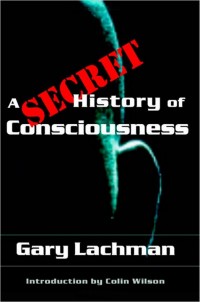A Secret History of Consciousness
By Gary Lachman (Author), Colin Wilson (Foreword)
Published by Lindisfarne Books (May 1, 2003) Buy this Book!
This book is essential reading for anyone who seeks to understand human consciousness. It is astounding to think that we explore the depths of the ocean and the outer reaches of space without putting a similar effort into exploring the true nature of the human mind. Perhaps I am expecting too much of those who have the resources for such exploration.
Machines may assist in identifying left and right brain, the activity of neurons and so forth, but they will never enlighten our understanding of perception, cognition and other facets of consciousness. Gary Lachman clearly explains how consciousness itself can unravel its mystery. He traces the ideas of many great minds and pulls them together in a way that makes it clear that human consciousness evolves and in particular, self-consciousness. Here lies the key; have we developed our own self-consciousness or do we still rely on group consciousness. Perhaps this idea holds a clue for our scientists.
Who better than Gary Lachman, the Science Writer, to scope human consciousness in the way he has in this book? The evolution of self-consciousness is in our face every day. How many young people die as they challenge themselves in extreme sports? How many people create unnecessary difficulties for themselves and what about the bizarre practice of self-harm.
Lachman makes this point when he writes: “[Colin] Wilson recognised that the attraction of inconvenience and living dangerously is not in the actual problems or challenges they present, but in the focus and concentration we bring to bear on meeting them. Heidegger and Gurdjieff hit the nail on the head when they said that the thought of one’s death can lead to an experience of “being” – the thought, not the actual confrontation.”
I will be referring back to this book often as I seek to understand the development of my own consciousness as well as the challenges that we face as a human race living in today’s world. – Review by Kristina Kaine
//


I do very much appreciate Kristina Kaine’s reviews for this Blog, and also those of works or books out of Anthroposophy, as well as Anna Sclar’s comments.
I was recently very moved to read a portion near the end of the book “Human and Cosmic Thought,” Four Lectures by Rudolf Steiner, 1914 (published by the Rudolf Steiner Press), very relevant to “…In the Spirit of Franz Brentano”, and wanted to share it here.
“[Regarding] contemporary physiology e.g., ‘motor’ and ‘sensory’ nerves. [This] acts as a hindrance to all true knowledge of the nature of thought and the nature of the soul. Never will it be possible to understand human thought if physiology sets up such an obstacle to true knowledge. But things have gone so far that an indefensible physiology forms the introduction to every textbook of psychology and teaching about the mind and makes it dependent on falsity. Therewith the door is bolted also against knowledge of cosmic thought.” His pain in communicating these facts of his time, and our time still, is obvious and painful to read. He had spoken many times of the tragedy of Nietsche.
Thus: “…in the spirit of Franz Brentano” and “The challenges that we face as a human race living in today’s world.”
Martha Keltz
I will just add today that I believe that in order to understand how such an initiative as “Now I See..” could be taken further (especially anthroposophically) by contributors, it is best to first undertake a study of Astronomy, followed by Astrosophy – especially authors Elizabeth Vreede and Willi Sucher – if this will be necessary to come to a better understanding of “Human and Cosmic Thought” (as I’ve personally had to do). Its four enlightening lectures can relate to all of the book reviews as are available on “Now I See…”, books by such different authors and personalities as John Kroger, Walter Russell and Gary Lachman (thanks to the RS Archive.)
RS quote: “One can especially cultivate each of these seven world-outlook-moods, and each of them can exist in one or other shade… What I have just depicted is actually the spiritual correlative of what we find externally in the world as the relations between the signs of the Zodiac and the planets, the seven planets familiar in Spiritual Science..” Gnosticism as Saturn, Logicism as Jupiter, Voluntarism as Mars, Empiricism as Sun, Mysticism as Venus, Transcendentalism as Mercury, Occultism as Moon.
Sure enough —
RS: “One can be all of the seven – or have – all of the seven world-outlooks to circle round the 12 ‘at rest’ world-outlooks, and there can be no others, only transitions from one to the other.”
Martha